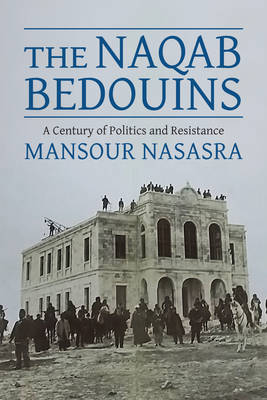
Stock image for illustration purposes only - book cover, edition or condition may vary.
The Naqab Bedouins: A Century of Politics and Resistance
Mansour Nasasra
€ 89.84
FREE Delivery in Ireland
Description for The Naqab Bedouins: A Century of Politics and Resistance
Hardback. Num Pages: 320 pages, 11 figures. BIC Classification: 1FBH; HBJF1; JHMC; JPS. Category: (P) Professional & Vocational. Dimension: 229 x 152. Weight in Grams: 454.
Conventional wisdom positions the Bedouins in southern Palestine and under Israeli military rule as victims or passive recipients. In The Naqab Bedouins, Mansour Nasasra rewrites this narrative, presenting them as active agents who, in defending their community and culture, have defied attempts at subjugation and control. The book challenges the notion of Bedouin docility under Israeli military rule and today, showing how they have contributed to shaping their own destiny. The Naqab Bedouins represents the first attempt to chronicle Bedouin history and politics across the last century, including the Ottoman era, the British Mandate, Israeli military rule, and the contemporary schema, and document its broader relevance to understanding state-minority relations in the region and beyond. Nasasra recounts the Naqab Bedouin history of political struggle and resistance to central authority. Nonviolent action and the strength of kin-based tribal organization helped the Bedouins assert land claims and call for the right of return to their historical villages. Through primary sources and oral history, including detailed interviews with local indigenous Bedouins and with Israeli and British officials, Nasasra shows how this Bedouin community survived strict state policies and military control and positioned itself as a political actor in the region.
Product Details
Publisher
Columbia University Press
Format
Hardback
Publication date
2017
Condition
New
Weight
453 g
Number of Pages
304
Place of Publication
New York, United States
ISBN
9780231175302
SKU
V9780231175302
Shipping Time
Usually ships in 7 to 11 working days
Ref
99-1
About Mansour Nasasra
Mansour Nasasra is lecturer in Middle East politics and international relations at the Department of Politics and Government, Ben Gurion University of the Negev. Nasasra has taught at the University of Exeter, Plymouth University, and the Hebrew University. He was a research fellow at the Council for British Research in the Levant and has been a recipient of British Academy grants. Nasasra is coeditor of The Naqab Bedouin and Colonialism: New Perspectives (2015).
Reviews for The Naqab Bedouins: A Century of Politics and Resistance
In The Naqab Bedouins, Nasasra uncovers marvelous material that illuminates the history of the Bedouins of southern Palestine and challenges prevailing understandings of their politics and social experiences. The long historical perspective that takes us from Ottoman times to the present relies on Nasasra's prodigious original research and superb documentation to present a comprehensive and detailed picture of this Bedouin community struggling against state power.
Lila Abu-Lughod, Joseph L. Buttenweiser Professor of Social Science, Columbia University What makes Nasasra's study of the Bedouins in Israel especially interesting is the close parallel with the experience of Bedouin communities throughout the Middle East. Refreshingly, he avoids romanticizing the Bedouins while focusing on their resistance as an indigenous people to policies that are, in effect, if not always in design, anti-nomadic. His comparative, historicized approach, moreover, offers an intriguing entry to wider debates about different forms of nationalism and identity in Arab societies.
Yezid Sayigh, senior fellow, Carnegie Middle East Center A book like no other. Nasasra tells the riveting story of the Palestinian Bedouins of the Naqab and Bi?r al-Saba? from the late Ottoman era until today, opening up a new vista for understanding the place of indigeneity in the Middle East and highlighting resistance and power relations that shadow the lives of the Naqab Bedouins. Particularly strong is his discussion on indigeneity scholarship in reference to international law. Nasasra has not just written a book on Bedouins-he has given a voice to the most marginalized among the Palestinians in Israel.
Larbi Sadiki, Qatar University
Lila Abu-Lughod, Joseph L. Buttenweiser Professor of Social Science, Columbia University What makes Nasasra's study of the Bedouins in Israel especially interesting is the close parallel with the experience of Bedouin communities throughout the Middle East. Refreshingly, he avoids romanticizing the Bedouins while focusing on their resistance as an indigenous people to policies that are, in effect, if not always in design, anti-nomadic. His comparative, historicized approach, moreover, offers an intriguing entry to wider debates about different forms of nationalism and identity in Arab societies.
Yezid Sayigh, senior fellow, Carnegie Middle East Center A book like no other. Nasasra tells the riveting story of the Palestinian Bedouins of the Naqab and Bi?r al-Saba? from the late Ottoman era until today, opening up a new vista for understanding the place of indigeneity in the Middle East and highlighting resistance and power relations that shadow the lives of the Naqab Bedouins. Particularly strong is his discussion on indigeneity scholarship in reference to international law. Nasasra has not just written a book on Bedouins-he has given a voice to the most marginalized among the Palestinians in Israel.
Larbi Sadiki, Qatar University
